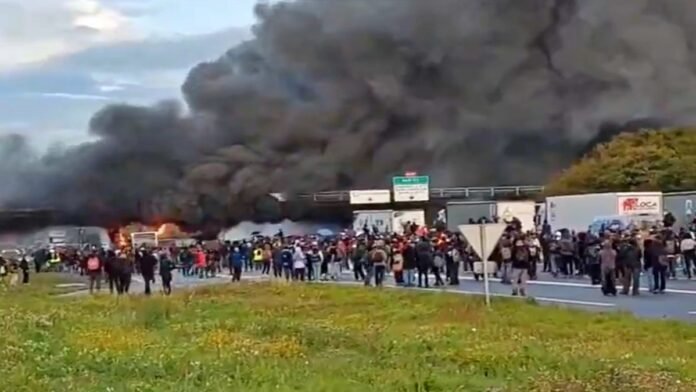
Key Points:
- Nationwide “Bloquons Tout” (Block Everything) protests disrupt highways, railways, and major cities across France on September 10, 2025
- New PM Sébastien Lecornu takes office just 48 hours after François Bayrou’s government collapsed in confidence vote
- 80,000 police officers deployed nationwide with 6,000 stationed in Paris to handle expected 100,000 protesters
- 200+ arrests made across France including 75 detained in Paris as protesters clash with riot police
- €43.8 billion austerity budget sparked outrage leading to grassroots movement organized via social media since summer 2025
Paris: France is facing its most significant civil unrest since the 2018 Yellow Vest protests as the “Bloquons Tout” (Block Everything) movement launched coordinated nationwide demonstrations on September 10, 2025. The protests coincide with Sébastien Lecornu officially taking office as France’s new Prime Minister at noon, marking his appointment as the fifth PM in less than two years under President Emmanuel Macron.
Widespread Disruption Across Major Cities
The leaderless protest movement has caused significant disruptions on highways nationwide, affecting major cities including Paris, Marseille, Montpellier, Nantes, Lyon, Bordeaux, and Toulouse. In Paris, riot police deployed tear gas against young demonstrators blocking access to high schools, while firefighters cleared burning debris from barricades.
Interior Minister Bruno Retailleau reported that protesters set a bus on fire in Rennes and attacked police with heavy cobblestones. At Gare du Nord train station, police successfully prevented approximately 1,000 protesters from taking control of the facility. Traffic operator Vinci confirmed highway disruptions across the country, with protesters using burning tires and refuse bins to block major routes.
Government Response and Security Measures
The French government has mobilized 80,000 security personnel nationwide, with 6,000 officers stationed specifically in Paris. This massive deployment aims to protect critical infrastructure including airports, public transport systems, power plants, and water treatment facilities from potential disruption.
Bruno Retailleau warned that later protest gatherings might be infiltrated by “radical, ultra-left factions” potentially escalating into violence. The minister noted concerns about social media appeals encouraging people to loot shops and target oil depots, supermarkets, and petrol pumps.
Origins of the Block Everything Movement
The “Bloquons Tout” movement emerged on social media in May 2025, initially organized by right-wing groups but later adopted by leftist and far-left elements. The protests were triggered by the €43.8 billion austerity budget proposed by former PM François Bayrou, which included controversial measures such as:
- Removal of two national holidays
- Freeze on pensions
- Significant cuts to healthcare spending
- Reduced medical reimbursements
The movement gained momentum through Telegram channels and social media platforms using hashtags **0septembre2025 and the slogan *“Boycott, désobéissance et solidarité” (Boycott, disobedience and solidarity)*.
Political Crisis Deepens
The protests come just 48 hours after François Bayrou’s government collapsed in a confidence vote on Monday evening. President Macron quickly appointed Sébastien Lecornu, his former defense minister and close ally, but this decision has further enraged protesters who view it as continuity of failed policies.
Protesters’ demands include Macron’s resignation and dissolution of the National Assembly for snap elections. At demonstrations, banners reading “Macron resign” were prominently displayed, while union representatives declared “there will be no capitulation”.
Comparison to Yellow Vest Movement
Analysts draw parallels between “Block Everything” and the 2018 Yellow Vest protests, which began over fuel price increases but evolved into broader opposition to Macron’s economic reforms. However, research by sociologist Antoine Bristielle shows Block Everything supporters are generally younger, more left-aligned, and focused on collective interests and environmental concerns.
The current movement is less structured than Yellow Vests, having emerged organically online without central leadership, making it difficult for authorities to predict the scale and scope of disruptions.
Union Support and Future Actions
Major trade unions CGT and SUD have endorsed the September 10 action, with broader strike calls planned for September 18. An Ipsos poll shows 46% of French people support the movement, with backing extending beyond left-wing sympathizers to include more than half of far-right National Rally voters.
Healthcare workers and pharmacy workers are particularly vocal, protesting cuts to medical reimbursements and discounts on generic drugs, with their unions calling for a nationwide shutdown on September 18.
Economic and Political Implications
The protests highlight France’s deep political gridlock and institutional crisis. With Lecornu becoming the fifth PM in less than two years, the fragile minority government faces immediate challenges from both financial markets and public discontent over the economic standstill.
The movement represents widespread hatred for President Macron and frustration with what many perceive as a dysfunctional political class. As one retired headmaster told Euronews: “We are witnessing widespread hatred for the president. Suddenly, many people have started to hate this man”.
The success of the Block Everything movement could determine whether France enters a prolonged period of social unrest similar to the Yellow Vest crisis, which ultimately cost the government nearly $20 billion in concessions before subsiding.








































